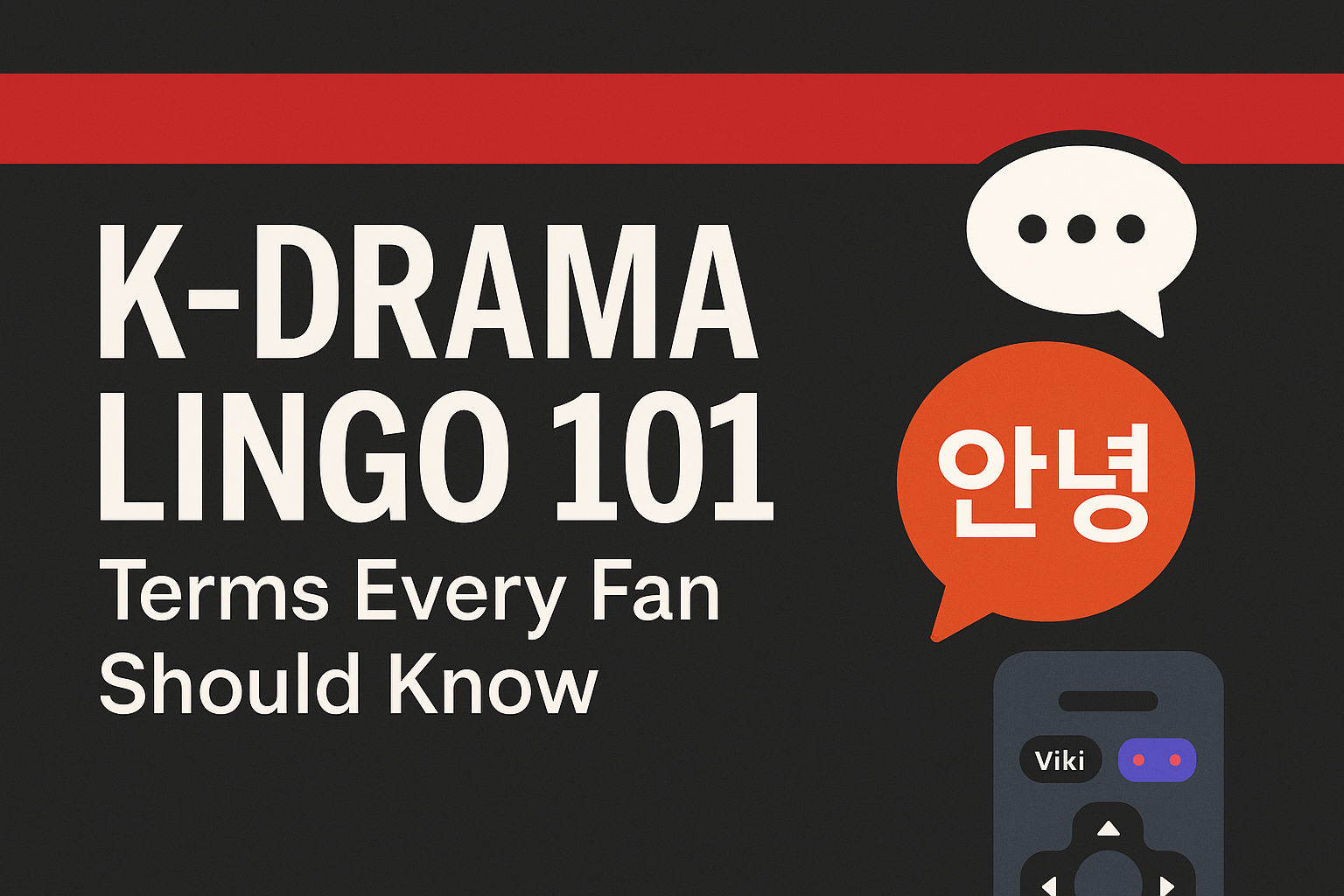So you’ve started watching K-Dramas — welcome to the obsession! You’re swooning, crying, laughing… but also slightly confused. What’s a “noona”? Why do people keep calling each other “oppa”? And what exactly is a second lead syndrome?
K-Dramas aren’t just a genre — they come with their own language. While most of the shows come with English subtitles, many expressions don’t translate perfectly. Understanding the lingo makes the experience richer, funnier, and more emotional.
This guide covers the most essential K-Drama terms you’ll hear again and again — whether you’re a total newbie or someone who’s five dramas deep and falling fast.
1. Oppa (오빠)
Literal meaning: Older brother (used by females)
In K-Dramas, “oppa” is a term a woman uses to refer to an older male — but when used romantically, it often means “boyfriend” or “crush.” It’s one of the most iconic K-Drama words, signaling affection, protection, and sometimes a whole lot of flirting.
✅ Watch for it in: Any romantic drama ever. Especially when the female lead shyly says “oppa…” before a kiss scene.
2. Noona (누나)
Literal meaning: Older sister (used by males)
Used by younger males when talking to an older female. In romances, it’s common when the woman is a few years older. Expect playful teasing and a lot of blushing.
✅ Used in: “Something in the Rain,” “Romance Is a Bonus Book”
3. Hyung (형)
Literal meaning: Older brother (used by males)
Male-to-male term. You’ll hear this often between friends, brothers, or soldiers. It expresses loyalty and respect.
4. Sunbae / Hoobae (선배 / 후배)
- Sunbae = Senior (in school or workplace)
- Hoobae = Junior
You’ll hear these terms a lot in dramas set in schools, offices, or hospitals. A sunbae might mentor a hoobae, or — in classic K-Drama style — fall in love with one.
✅ Used in: “Doctors,” “Weightlifting Fairy Kim Bok Joo”
5. Second Lead Syndrome (SLS)
A fan-made term for when you fall in love with the second male lead — the guy who’s usually kinder, more stable, and still doesn’t get the girl.
He makes your heart ache because… he never wins.
✅ Famous victims: Han Ji Pyeong (Start-Up), Baek In Ho (Cheese in the Trap)
6. Makjang (막장)
A style of drama known for being over-the-top, dramatic, and messy. Expect secret twins, amnesia, birth secrets, evil mothers-in-law, and dramatic slaps.
✅ Examples: “Penthouse,” “Temptation of Wife,” “The World of the Married”
7. Chaebol (재벌)
A super-rich family or heir to a massive Korean corporation. In K-Dramas, chaebol characters are usually arrogant male leads who slowly fall for poor, feisty heroines.
✅ Watch in: “The Heirs,” “My Secret Romance,” “Business Proposal”
8. Daebak (대박)
A Korean exclamation meaning awesome, amazing, or hit the jackpot. You’ll hear it when characters are shocked, impressed, or excited.
✅ Example usage: “Daebak! That kiss scene was everything!”
9. Aegyo (애교)
A form of cute behavior — baby talk, pouty faces, and gestures — meant to charm or manipulate. Some characters do it naturally, others fake it hilariously.
✅ Used in: Rom-coms, variety shows, and real-life K-pop idol moments.
10. TSUNDERE (borrowed from Japanese anime)
A character — usually the male lead — who’s cold and rude on the outside, but secretly warm and caring. Classic K-Drama trope.
✅ Watch in: “My Love from the Star,” “Healer,” “Secret Garden”
11. Sageuk (사극)
A historical drama, usually set during Korea’s Joseon dynasty. These are full of palaces, hanboks, royalty, and political intrigue.
✅ Examples: “Moon Lovers: Scarlet Heart Ryeo,” “Mr. Queen,” “The Red Sleeve”
12. Skinship
A Korean-English term referring to physical affection — holding hands, hugging, kissing. K-Dramas tend to build up to physical contact slowly, making every touch more intense.
✅ Example: That single wrist grab at episode 10 = emotional earthquake.
13. Cliffhanger
Okay, this one’s not unique to K-Dramas, but they take it to a new level. Almost every episode ends on a cliffhanger — dramatic glances, surprise slaps, or last-second kisses.
✅ Pro tip: Don’t start a K-Drama at midnight unless you plan on losing sleep.
Bonus Terms You’ll Hear in Subtitles:
- Jagiya (자기야): “Honey” or “Babe” — used in romantic couples.
- Ajusshi (아저씨): Middle-aged man.
- Unnie (언니): What younger women call older sisters or female friends.
- Appa / Umma (아빠 / 엄마): Dad / Mom
Final Thoughts
Part of what makes K-Dramas so addictive is the emotional language — not just what characters say, but how they say it. Learning the lingo helps you connect more deeply with the story and culture.
So next time you hear “Oppa!” or feel that second lead heartbreak, you’ll know: you’re officially fluent in K-Drama.
